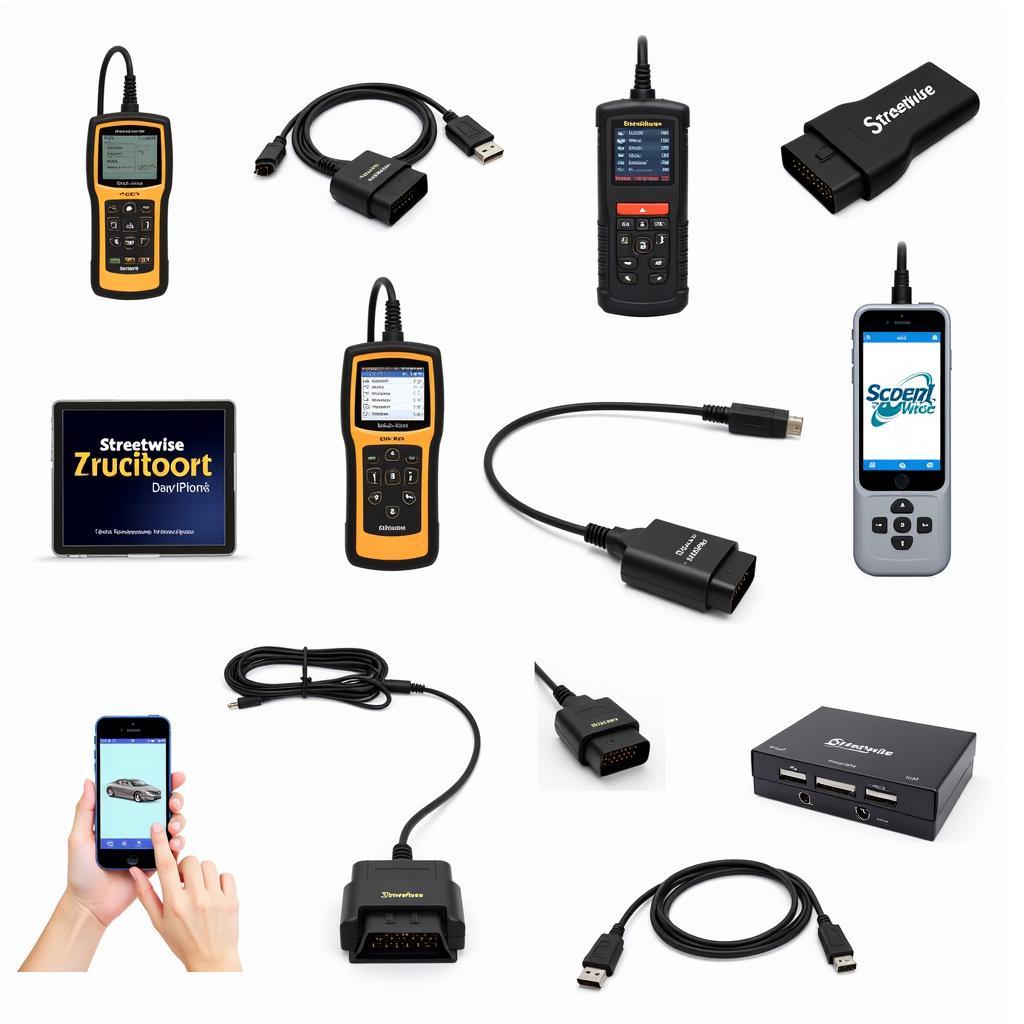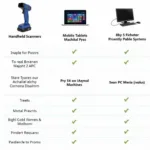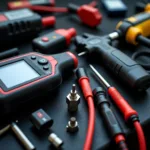Modern cars are intricate machines, filled with sensors and computers that monitor and control every aspect of their operation. When something goes wrong, understanding those complex systems can feel overwhelming. That’s where streetwise car diagnostics come in, providing you with the tools and knowledge to take control of your car’s health. No longer do you have to rely solely on expensive mechanics; you can empower yourself to diagnose and potentially fix minor issues, saving both time and money.
The Power of Streetwise Car Diagnostics
Streetwise car diagnostics refers to using readily available, user-friendly diagnostic tools and resources to troubleshoot car problems. These tools, often more affordable than professional-grade equipment, allow you to:
- Read and Understand Error Codes: Most modern cars have onboard diagnostic systems (OBD-II) that store error codes when problems arise. Streetwise car diagnostic tools can read these codes, providing you with a starting point for understanding what’s wrong.
- Monitor Live Data: Beyond just error codes, these tools can often display live data from your car’s various sensors. This real-time information can be invaluable in diagnosing intermittent problems or understanding how your car is performing.
- Reset Warning Lights: Once you’ve addressed a problem, streetwise diagnostic tools usually allow you to reset the check engine light or other warning lights on your dashboard.
- Empower DIY Repairs: By understanding the source of the issue, you can often make informed decisions about whether to tackle a repair yourself or seek professional help.
Choosing the Right Streetwise Diagnostic Tool
The market offers a range of streetwise car diagnostic tools, each with varying levels of functionality and complexity. Here’s what to consider:
- Type of Tool: Basic code readers provide error codes, while more advanced scan tools offer live data, graphing capabilities, and even component activation for testing.
- Vehicle Compatibility: Ensure the tool you choose is compatible with your car’s make, model, and year.
- User Interface: Opt for a tool with a clear and intuitive interface, especially if you’re new to car diagnostics.
- Features: Consider features like Bluetooth connectivity, data logging, and manufacturer-specific code definitions for added convenience and functionality.
Beyond the Tool: Resources for Streetwise Car Diagnostics
A diagnostic tool is only as good as the information you can glean from it. Thankfully, a wealth of resources are available to help you decipher those cryptic error codes and make sense of your car’s data:
- Online Forums and Communities: Connect with fellow car enthusiasts and mechanics who can provide insights, advice, and potential solutions based on your specific error codes and symptoms.
- Repair Manuals: Invest in a comprehensive repair manual for your car model. These manuals often provide detailed troubleshooting guides and repair instructions.
- DIY Websites and Videos: Numerous websites and YouTube channels offer step-by-step guides and tutorials on diagnosing and fixing common car problems.
Streetwise Car Diagnostics: A Word of Caution
While streetwise car diagnostics empower car owners, it’s crucial to remember that not all problems are created equal. Some issues require specialized knowledge, tools, or safety precautions best left to professional mechanics.
- Complex Repairs: Engine or transmission problems, airbag systems, and other safety-critical components are best left to the professionals.
- Safety First: Always prioritize safety when working on your car. Disconnect the battery before working on electrical components, and use caution when handling fluids or working under the hood.
- Know Your Limits: Don’t hesitate to seek professional help if you encounter a problem beyond your comfort level.
Conclusion
Streetwise car diagnostics can be a game-changer for car owners, providing a deeper understanding of their vehicles and potentially saving them time and money on repairs. By choosing the right tools, leveraging available resources, and exercising caution, you can become a more informed and empowered car owner.
FAQs
1. Will a streetwise diagnostic tool work on any car?
Most modern cars (manufactured after 1996) use the OBD-II standard, making them compatible with a wide range of diagnostic tools. However, some tools offer enhanced features or manufacturer-specific code definitions that might be more suitable for certain car makes.
2. Can I fix any problem myself using streetwise diagnostics?
Streetwise diagnostics is an excellent starting point, but it’s essential to be realistic about your limitations. While you can diagnose and potentially fix minor issues yourself, complex problems are best left to qualified mechanics.
3. What are some common car problems I can diagnose myself?
Common problems include oxygen sensor issues, loose gas caps, faulty spark plugs, and emissions system malfunctions. However, always double-check the specific error codes and symptoms with reliable resources before attempting any repairs.
4. What should I do if the check engine light comes on after a repair?
Sometimes, the check engine light might remain on even after addressing the initial problem. This could be due to a pending code that needs to be cleared. In such cases, you can use your diagnostic tool to reset the light. If the light comes on again, further investigation is needed.
5. Are there any risks associated with using a streetwise car diagnostic tool?
When used correctly, these tools pose minimal risk. However, it’s crucial to avoid tampering with any components or settings you don’t fully understand. Incorrect modifications can potentially damage your car’s systems.
6. Can I use a streetwise diagnostic tool to improve my car’s performance?
While these tools primarily focus on diagnosing problems, some advanced models allow you to monitor performance data like engine speed, fuel economy, and more. This information can be helpful for understanding your car’s performance characteristics.
7. What are some reliable resources for finding car repair information?
Reputable online forums, dedicated DIY car repair websites, and comprehensive repair manuals specific to your car model are excellent sources of information. Always cross-reference information from multiple sources for accuracy.
Still Have Questions? We’re Here to Help!
Need help deciphering a tricky code or unsure about the best diagnostic tool for your car? We’ve got you covered! Our team of car diagnostic experts is just a message away. Contact us via WhatsApp: +1(641)206-8880 or Email: [email protected] for 24/7 support.
For a deeper dive into specific tools and their features, check out our user manual streetwize car diagnostic tool section. Want to learn more about advanced diagnostic options? Our page on streetwize car diagnostic tool epb can help. If you’re looking for a hands-on approach, you can find diagnostic test on cars near me . For a detailed guide on using your tool, our comprehensive streetwize car diagnostic tool manual is an invaluable resource.


